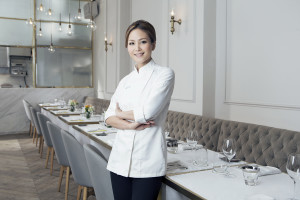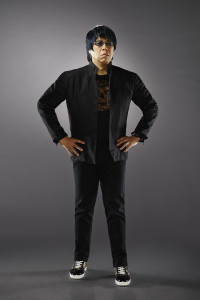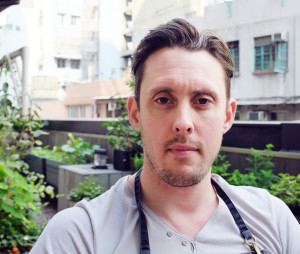March 3 to May 18, 2015
INSPIRATIONS, CHALLENGES, AND MOTIVATIONS
A RECAP OF OUR FIRST CHEF TALKS
by Danielle Chin
It’s not often diners are able to have a deep discussion with the chefs of their favorite Michelin-starred restaurants, but from March 3 to May 18, the Chef Talks series presented by Slow Food and The Fringe Club made that dialogue possible. Over seven evenings, eight iconic Hong Kong chefs sat down for an intimate conversation with Andrew Sun, a committee member of Slow Food HK. From those talks, we learned what each renowned chef is like both behind the kitchen and outside of it.
“I want it to be embedded in their mind forever, full impact, scar them.”
– Chef Alvin Leung
Often overshadowed by their Instagram-ed dishes, some of the chefs were not as accustomed to being under a spotlight and the center of attention. Sun soon put them at ease, and the Chefs opened up about their backgrounds, and their inspirations, challenges, and motivations.
“I tried to approach [the talks] as casual conversations and private chats even though we were in front of a full theatre at the Fringe Club,” Sun said. “There are a lot of basic things I wanted to ask these chefs so I just pretended we were talking in a pub. The audience also put forth some great questions adding extra color to the discussion.”

Chef Vicky Lau revealed that contrary to popular belief, the name of her Michelin-starred restaurant Tate Dining Room and Kitchen has no relation to Tate Modern (the art museum in London). She does take creative inspiration from famous artists like surrealist René Magritte who played with his visual subjects and viewers’ expectations. For instance, Lau’s visually pleasing amuse-bouche appears to be an elegantly arranged row of five unique bites in concave slots of a narrow platter. Upon closer inspection, a theme emerges—each bite is representative of the Chinese elements water, fire, earth, wood, and metal. Chef Lau explained that she strives to create more than a fine dining experience. Rather, she offers both a visual and an edible feast; a journey through works of art. And much like art, the experience often defies expectations.

In a similar vein, Chef Alvin Leung also expresses visual creativity and a playful nature in his dishes. But the self-styled “Demon Chef” of Hong Kong, Chef Leung pushes the juncture of food and creativity close to the edge and sometimes towards controversy. While Chef Richard Ekkebus observed that “simplicity is good as long as it is not simplistic”, Chef Leung seems to swing toward the other end of the spectrum when he voiced his mission to take the diner out of his “comfort zone and bring them to the edge—closer and closer to the edge without falling.” While that may sound like a simple task for such a renowned innovator like Chef Leung, he is often challenged by the logistics of executing his creative ideas. Much to the audience’s surprise, he assured us that his infamous edible condom was in fact, a step backward from his original idea.
“Surround yourself with people who push you to the edge.”
– Chef Richard Ekkebus
Many of the chefs touched upon the importance of their team and emphasized that cooking in restaurants was a team effort and not a solo act. To this end, Chef Richard Ekkebus of Amber, notes the necessity to consistently improve, especially to one’s own motivator by criticizing oneself. He points to his staff as one part of his success; Chef Ekkebus is surrounded by a team that motivates each other as well as themselves.
Staffing a good team presents its own particular set of challenges for a chef in Hong Kong. Chef Uwe Opocensky, Mandarin Oriental’s Executive Chef, observed that being a service staff is not well respected in Asia. This results in a shortage of labor, thereby making it difficult to reduce staff turnovers and maintain consistency.
In some respects the professional kitchen is still thought of as a male dominated arena; it might be unexpected to see females, especially in management roles. However as Asia’s Best Female Chef of 2015, Chef Lau is proving such outdated thinking as outdated—“If you have a huge pot of stock you can’t lift, you just lift twice.”
The typically reserved Chef Umberto Bombana of 8 1/2 Otto e Mezzo BOMBANA opened up about his experience coming to Hong Kong and adapting to the palette of local diners. He also poked fun at his personal health challenges. “I’m still fat,” he joked, prompting a big laugh from the audience.
“We need to find local food streams, and alternative food streams.”
– Chef Uwe Opocensky
All of the chefs voiced the importance of eating locally, sustainably, and according to nature’s seasons, but it was Chef Opocensky who perhaps delved deepest into the subject. Not only does Hong Kong need to change its mindset towards being more locally driven, he said, but as a society we need to find “alternative food streams.” While he has yet to find an acceptable recipe for the palette, Chef Opocensky used cricket flour as an example for a potential alternative food source.

Passionate about local products and seasonality in their own cooking, NUR’s Chef Nurdin Topham and Neighborhood’s Chef David Lai challenged consumers to rethink about the dining habits completely. “Maybe we all need to eat less,” Chef Lai proposed.
Chef Opocensky also stressed the importance of eating in season, according to what nature provides. “Why do we eat strawberries twelve times a year,” he questioned. Nature has set ways that we need to follow. “We should only be eating strawberries when they are in season. It took one generation to make the mess, it can take another to fix it all.”
Chef Olivier Elzer of Seasons ensures his menu highlights seasonal ingredients in traditional dishes. He is also influenced by nature’s seasonal elements and designs his restaurant accordingly. Chef Elzer’s ‘Greenhouse’ room is the type of setting that could lighten up the darkness of Hong Kong’s rainy season.
Whether their expertise lies in European or Chinese cuisine, modernist, or traditional styles, each chef clearly displayed his and her raw passion for their craft—passion for their creative product and food values, their dedicated teams, their supportive families, and most of all, their customers’ experiences. Their genuine passion serves as a memorable quality in an difficult and often unforgiving industry that consistently pushes beyond boundaries previously set.
We are editing our footage from the series and will make available online video clips and photos soon. Due to the enthusiastic reception of the Chef Talks series, Slow Food HK is planning another series for 2016. Our committee has put on their thinking caps to come up with another line up of stellar Hong Kong chefs and interesting topics for next year! Stay tuned.